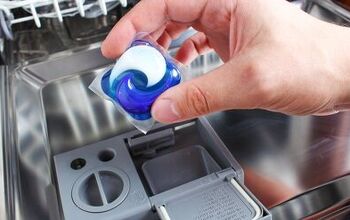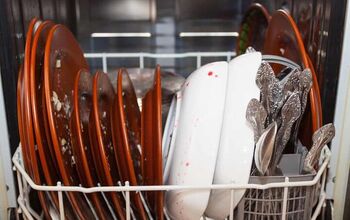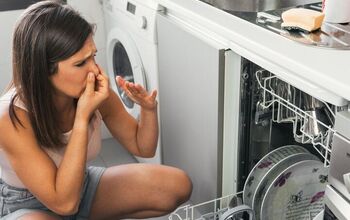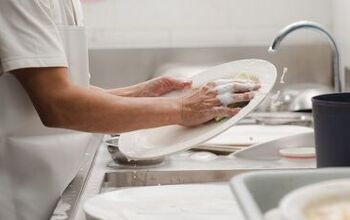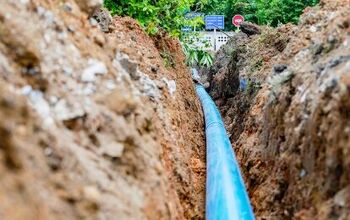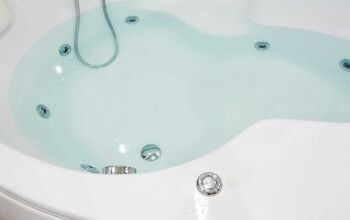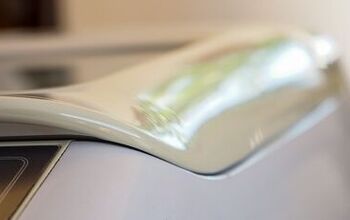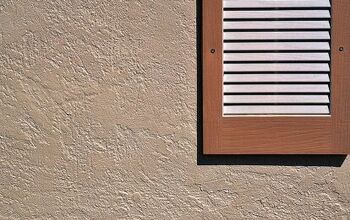How To Add Phosphates To Dishwasher Detergent (Do This!)

Dishwasher detergent is one of the most heavily-advertised types of detergent on the market. Though it’s advertised a bunch, there always seems to be a way to improve it. This is especially true if you have an older dishwasher that isn’t cleaning like it used to. That’s why many homemaking mavens started to add phosphates to dishwasher detergent. But, how can you do it?
Most dishwashers will do well with adding 1/2 teaspoon of trisodium phosphate (TSP) mixed in with liquid detergent. You can add the TSP straight into the same compartment as the liquid dishwasher detergent. Once that’s done, close the door and start your dishwasher like you would with regular detergent.
If you’ve been looking for a way to get your dishwasher to “rise from the dead,” then using this additive could be a smart solution. While it can work, it’s still controversial. Here’s what you need to know…
Why Is Adding TSP To Detergent A Good Idea?
Trisodium phosphate is one of the most powerful cleaning agents known to man, especially when it comes to dissolving grease and sticky substances. That’s why it’s one of the top choices for removing nicotine stains off walls, and why it’s also used for getting rid of serious mold stains as well.
It’s so powerful, commercial cleaning companies use it as a base for some of their toughest jobs. This comes into play when you’re washing dishes twofold. First off, it’ll clean whatever glop is on your dishes, 100 percent. Secondly, it can also help clean up residue and other crud that causes clogs in your dishwasher system. This, in turn, makes your dishwasher run more efficiently.
How Often Should You Add Phosphates To Your Dishwasher?
There’s no real set guideline when it comes to adding phosphates to your dishwashing detergent, however using it daily is not always necessary. A good rule of thumb is that you should add it once a week to keep your washer in tip-top shape, or whenever you start to notice that your dishes look a little dull.
Do All Dishwashers Do Well With Phosphates?
For the most part, you should never worry about using TSP in a dishwasher. Even the most sensitive dishwashers are rugged enough to handle some trisodium phosphate. After all, the vast majority of dishwashers were made in a time when phosphates were everywhere. Moreover, most states do NOT have a ban on phosphates, so it’s still a part of the overall design minimum.
Why Did Adding Phosphates To Detergent Become Popular?
It all started in 2011, when studies revealed how phosphates in the water could encourage algae and other environmentally-damaging problem critters, phosphates started to get banned. Prior to that, phosphates were one of the most common additives you could find in detergent.
The ban was enacted in multiple areas, but most dishwasher detergent companies started making phosphate-free formulas regardless of the state. The results were…not good. Most people complained, but there are some who started to add phosphates on their own. Those people were the ones who kickstarted the trend.
Why Is TSP A Controversial Cleaning Additive?
Trisodium phosphate has a couple of issues that make people get a little skittish. For one thing, the EPA has called the substance an environmental hazard—at least, when it’s used improperly or in large quantities. It’s been known to encourage the growth of algae, which can harm sea life if it gets into water systems. As a result, multiple states banned the sale and use of TSP within their borders.
Moreover, it’s important to remember that trisodium phosphate is really caustic. If you have dishes that are sensitive to strong cleaners, TSP will strip them of their veneers in a flash. It could also possibly break them. Moreover, the caustic nature of TSP can also burn hands and skin. Wearing gloves when you handle it is a must.
Is Using TSP As A Detergent Booster Safe?
As long as you don’t add too much trisodium phosphate to your dishwasher detergent, you shouldn’t have a problem. With this material, the dose definitely makes the toxin. This is why it’s best to keep it to half a teaspoon. The bigger issue is how caustic it can be. You should never use trisodium phosphate without gloves.
Getting Around The Phosphate Ban
Around 1.9 percent of all the phosphates used in America found their way through the dishwashing cycle. This means that the damage that it does to the environment is minimal, and in fact, is further reduced by the fact that most places have decent water filtration methods. If you live in a state that has banned the use of TSP, there might still be ways to get it…
- You can try major platforms like Amazon. Most of the bans mean that you won’t be able to get it in stores. Platform sites tend to be a little more lenient when it comes to the sale of phosphate.
- Opt for a phosphate-added detergent from out of state. The truth is that most detergents switched to a phosphate-free formula, but not all of them did. If you search up brands that have phosphates, you’ll see that Professional Line Cascade/Cascade Fryer Boil-Out and Bubble Bandit both make their own lines with this popular additive in them.
- Consider driving to another state. Yes, this is a little extreme, but if you live on the border between your state and a ban-free state, then it could make sense.
- Sometimes, you might just need to switch detergent brands. You don’t need phosphates to get sparkling clean dishes. If you want to keep it green, it may take a little experimentation to find a brand that works with your washer.
How Bad Is Using Phosphates In Your Dishwasher Detergent?
Honestly, it really depends on how you look at it. One thing is for sure: it’s not a green thing to do. If you want to use it, you need to be aware that the use of TSP will cause some marginal damage. However, the damage that it deals is going to be very low compared to something along the lines of using phosphates in fertilizer.
In most cases, it will not do that much damage. Even so, it’s never good to pollute when you can go around it. Some people might get judgmental about the use of phosphates which is why you probably shouldn’t tell anyone if you do.
Related Questions
Does Cascade make phosphate-free dish detergents?
While Cascade was once famous for adding phosphates to their detergents, the truth is that they now made a huge effort to overhaul their image. Almost all of their formulas are now phosphate-free, especially when you’re talking about their home-use line. You actually have to specially-order Cascade with phosphates in them.If you grab a box of Cascade off the shelves of your local store, you can rest assured it’s probably phosphate-free. Whether that’s a good thing or a bad thing is up to you to decide.
How much of the phosphates used in dishwasher detergent end up in local water lines?
This all depends on how much filtering is done, and how many people use phosphate-filled detergent. Some areas see as much as 9 to 34 percent of all the phosphorous that gets leached into rivers come from detergents. Due to the high concentrations of phosphorous some streams have faced, around 17 states have barred the use of phosphates as part of their policy.Phosphate use is particularly damaging if you live in an area where greywater regularly gets dumped into streams. We do not suggest using phosphates in these areas.
What phosphate alternatives are there?
If you want to get serious cleaning actions but don’t want to add trisodium phosphate to your detergent, there’s another way to make it happen. Most people find similar results by adding white distilled vinegar to their dishwasher loads. To get the best possible results, it’s best to stick to vinegars that are less dilute than what you’d use in food.Cleaning vinegar is usually the best bet here, though almost any type of vinegar will be tough on stains. A strength over 3 percent is ideal.
More Related Guides

Ossiana Tepfenhart is an expert writer, focusing on interior design and general home tips. Writing is her life, and it's what she does best. Her interests include art and real estate investments.
More by Ossiana Tepfenhart










